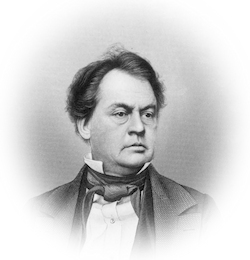Washington, D. C, May 5th, 1860.
Dear Stephens, Your letter from Lexington was duly recd, and I had intended an earlier answer but could not lay my hands upon my scattered fragments of briefs in the Persons and Oliver cases until yesterday. We have been all excitement here until yesterday when we heard of the final break up at Charleston, and things are now so complicated that it is difficult to tell what is best to be done. Douglas’s men made a great mistake in voting to go to the platform before nominating a Prest. A rupture then became inevitable; but he and his friends expected to profit by the secession of two or three states and therefore urged it in common with the various elements of combustion in the So. West. When they resolved to go to platform making I telegraphed Irwin to get a good one and a Southern man on it or bolt. Subsequently when we heard here that the convention had adopted the Tennessee platform I advised Nelms to go back and stand on it; but it appears now that the convention never did adopt except to the extent of the 2/3 of the whole number of delegates from all the states. The nomination of Douglas is now impossible under this rule, and if it were possible to nominate him, he cannot be elected. The amount of discontent with him in the free states would beat him there even if the South would vote for him as a unit, which I do not think possible under existing circumstances. The truth is the rivalry and rancor between the friends of Douglas and all the rest was so great and is now so great that I do not see how it can possibly be reconciled without the withdrawal of the combatants on both sides, which I think none of them have patriotism enough to do. But everything here is at sea. The only chance I see is to get all of them back upon some arrangement made outside and before the Balto. meeting. If this cannot be done I shall stand by the bolters and let things rock on. The Central states disgraced themselves by making an ultimatum and backing down from it. I think if they had stood by the Tennessee resolution an accommodation could be made. The real difficulty at Charleston was that a large number of Democrats North and South had committed themselves so far against Douglas that they were lost if he was nominated, and they therefore preferred ruining the party with themselves than ruining themselves without the party. This being the difficulty, it is evident that nothing but the defeat of Douglas can remedy it. I think tho’ he got within a few of his last vote when he reached 152. My health is good as also Julia’s and the rest of the family. I am heartily sick of this turmoil and regret that I had not taken your course last winter.
From Annual Report of the American Historical Association for the Year 1911.
Robert Augustus Toombs was an American lawyer, planter, and politician from Georgia who became one of the organizers of the Confederacy and served as its first Secretary of State. He served in the Georgia House of Representatives, the US house of Representatives, and the US Senate. In the Confederacy, he served in Jefferson Davis’ cabinet as well as in the Confederate States Army, but later became one of Davis’ critics.
Alexander Hamilton Stephens was an American politician who served as the vice president of the Confederate States from 1861 to 1865. After serving in both houses of the Georgia General Assembly, he won election to Congress, taking his seat in 1843. After the Civil War, he returned to Congress in 1873, serving to 1882 when he was elected as the 50th Governor of Georgia, serving there from late 1882 until his death in 1883.
